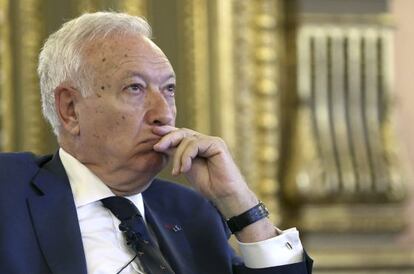Caracas has “a long way to go” on human rights, says foreign minister
José Manuel García-Margallo clarifies reasons for summoning Venezuelan ambassador

Spain’s foreign minister, José Manuel García-Margallo, sought on Tuesday to clarify the reasons behind a complaint lodged by Madrid the day before with the Venezuelan ambassador. Spain’s diplomatic chief made clear that the decision to summon Mario Isea was nothing to do with Venezuelan President Nicolás Maduro’s criticism of Spain’s so-called “gag law,” but rather because of his “insulting and unacceptable remarks” against Spanish Prime Minister Mariano Rajoy.
In a recent televised address, Maduro called Rajoy “a public hitman” and said that Spain’s new Citizens Safety Law, which was passed recently, “was nothing but a blow to democracy from Rajoy in the name of [dictator Francisco] Franco [...].”
The controversial Citizens Safety Law, which went into effect on July 1, puts limits on public protests and demonstrations and prohibits people from taking photographs of police officers – even when law enforcement officials are committing abuses. It was rejected by all the opposition parties in Congress but still passed into law thanks to the sole support of the governing Popular Party.
The Venezuelan people do not deserve to see their leaders express themselves this way toward other countries” Spanish Foreign Minister José Manuel García-Margallo
“Venezuela has a long way to go [on human rights],” Margallo told reporters, calling on the government in the South American country to listen to recommendations from a number of different international organizations on the issue.
Margallo added that the language used by Maduro “does not contribute to the improvement of relations between the two countries,” and said he felt sorry “for the Venezuelan people, who do not deserve to see their leaders express themselves this way toward other countries.”
He also stated that he had no problem with the Venezuelan parliament’s criticism of the gag law. “We are ready to accept any suggestion from third parties and, if it is intelligent and acceptable, we will adopt it,” he explained. The foreign minister also called on Venezuela to do the same, “especially when it has such a long way to go on human rights as many [international] organizations have revealed.”
“As far as we know, Venezuela does not have a permanent invitation to special rapporteurs on human rights [to visit the country]. Spain does and I think that is the right way to go,” he underlined, adding that he trusts Caracas will not consider this reminder an interference.
Margallo also said he regretted the fact that Venezuelan authorities did not allow a group of Spanish senators to visit imprisoned opposition members, such as Leopoldo López, on a recent trip they made to the country.
Tu suscripción se está usando en otro dispositivo
¿Quieres añadir otro usuario a tu suscripción?
Si continúas leyendo en este dispositivo, no se podrá leer en el otro.
FlechaTu suscripción se está usando en otro dispositivo y solo puedes acceder a EL PAÍS desde un dispositivo a la vez.
Si quieres compartir tu cuenta, cambia tu suscripción a la modalidad Premium, así podrás añadir otro usuario. Cada uno accederá con su propia cuenta de email, lo que os permitirá personalizar vuestra experiencia en EL PAÍS.
¿Tienes una suscripción de empresa? Accede aquí para contratar más cuentas.
En el caso de no saber quién está usando tu cuenta, te recomendamos cambiar tu contraseña aquí.
Si decides continuar compartiendo tu cuenta, este mensaje se mostrará en tu dispositivo y en el de la otra persona que está usando tu cuenta de forma indefinida, afectando a tu experiencia de lectura. Puedes consultar aquí los términos y condiciones de la suscripción digital.









































